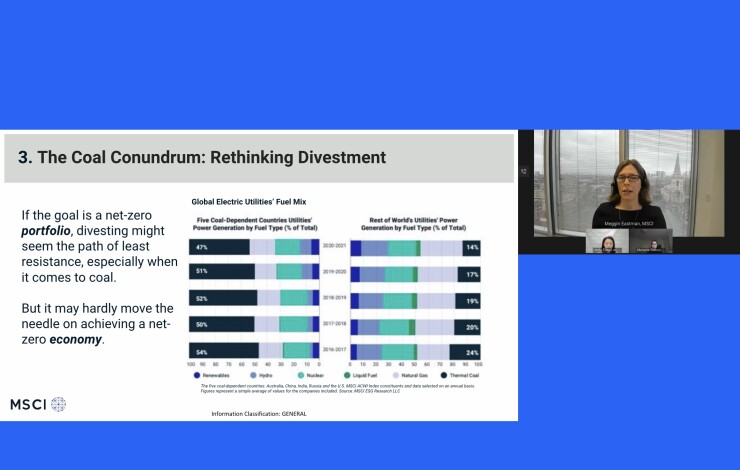A veteran J. P. Morgan financial advisor won a partial victory on Thursday when a federal judge ruled that she could try again to block the Wall Street bank from allegedly moving money out of her ultrarich clients’ accounts to other parts of the bank.
In a case that’s being closely watched on Wall Street, Judge Haywood Gilliam Jr. of U.S. District Court for the Northern District of California in San Francisco ruled that lawyers for advisor Gwen Campbell could file an amended request for a total restraining order preventing client money managed by Campbell from flowing to J.P. Morgan’s private bank.
The decision means that both
J.P. Morgan and lawyers for Campbell didn’t immediately have comments on the decision, held in an online public forum.

Campbell, a
As part of her complaint, Campbell, who works at the San Francisco branch of J. P. Morgan Advisors, had filed for a temporary restraining order seeking to stop any flows of her clients’ money to divisions of the bank where she doesn’t work. She filed for mandatory arbitration proceedings on Thursday.
Judge Gilliam questioned early on why Jennifer Selendy, a lawyer for Campbell, had prepared a restraining order motion before filing for arbitration. But he accepted her explanation that crafting a “workable” order was difficult given JPM’s internal rules. Selendy told the judge that “we were engaged in a period of negotiations with J.P. Morgan in hopes of settling the matter” out of court and that Campbell’s arbitration filing contains “additional claims not in the lawsuit.”

JPM has gone on the attack, denying in a legal filing on Dec. 3 that it had promised never to pitch private bank services to Campbell’s clients. In its filing, it also accused Campbell of attempting “to extort a settlement” to get out of what sources said was her 10-year contract with the bank — harsh words for a lucrative advisor whom it courted over nearly two years.
The lawsuit puts the bank in a tough spot, as it wants to keep its ultra high net worth clients. Richard Amador, a lawyer for J. P. Morgan, told the judge that “there’s no doubt in my mind that Ms. Campbell’s commitment is to do the best she can for her clients,” even though she’s suing her employer.
Simi Schaerer, a partner in the private wealth/banking and asset management group at Options Group, a global recruiting firm for senior financial executives, said Campbell’s lawsuit was being watched closely in the industry. The allegations contend that J. P. Morgan’s divisions employ a “hire-and-poach ‘playbook’” that puts brokers against private bankers.
“Big wealth managers will see this as precedent-setting for how they attract and retain talent,” said Schaerer, who is based in Zurich. “It will definitely give perspective to banks on hiring and movement.”

Banks, brokerages and independent advisory firms routinely sue former employees when they leave for a competitor and try to take colleagues or clients with them. (J.P. Morgan is
The judge’s decision highlights the friction built into the institutional fabric of global financial institutions with multiple approaches to managing rich clients’ money.
J.P. Morgan Advisors, known until last year as J.P. Morgan Securities, is a boutique brokerage unit that JPMorgan Chase inherited when it bought Bear Stearns in 2008 during the financial crisis; it has around 450 traditional brokers. The advisors unit, where Campbell works, sits within the bank’s much larger Consumer & Community Banking division. A separate division known as J.P. Morgan Wealth Management sits under the consumer banking group, which has nearly
From New York to London to Hong Kong, global banks everywhere are plagued by so-called “channel conflict,” in which armies of advisors (brokers) across various units and private bankers all compete for the same multimillionaires and billionaires, even if they’re already clients. The scrum is fueled by one unit selling investing, lending and investment banking services that overlap with those offered by other units. The conflict is baked into J.P. Morgan’s corporate structure: Bloomberg reported last July that the bank planned to appoint “concierges” for each team at J.P. Morgan Advisors to “help clients connect to other divisions and ensure tighter coordination with its commercial and investment banking arms.”
Easier said than done. “I’ve been working in this space for 18 years,” Schaerer said. “These conflicts are everywhere. You see this all the time.”

Campbell’s complaint alleged that soon after she arrived at J. P. Morgan’s San Francisco branch with her trophy roster, she had to fend off behind-the-scenes attempts by J. P. Morgan private bankers to poach her elite customers.
Her case may focus upon a “side letter” she signed with the bank as part of her contract. The unusual element, upon which Campbell insisted, spelled out written pledges by the bank that there would be no poaching of her clients by other bank units.
“It’s a very unusual situation,” Selendy told the hearing.

The sticky part, according to Schaerer, is that “the goal of every bank is to retain the clients, so the clients technically belong to the bank.” In its Dec. 3 filing, JPM said that “maintaining the nature of a relationship is not the same as a promise to never engage with clients on new business.” Schaerer argued that “there is a very fluid line between what is right and what is wrong” in situations like Campbell’s, but added that “there has to be a respect for these clauses.”
Campbell’s clients aren’t identified in her complaint. The Financial Times first
Within months of her arrival at J.P. Morgan, Campbell closed an eight-figure loan and an unsecured line of credit for Rodriguez, according to her complaint. Later, private banker Vince La Padula, the global head of lending, deposits and custody, began dangling before Rodriguez an additional eight-figure loan on more favorable terms — but only if he would move all of his money away from Campbell and into the private bank, Campbell’s lawsuit alleged.
Last July, Rodriguez used his Campbell-brokered loan to
“The Private Bank thus used the Sports Team Loan as a ruse to drastically restructure Pro Athlete Client’s relationship with J.P. Morgan and position the Private Bank to begin siphoning off assets under Campbell’s management,” Campbell’s lawsuit alleged. Rodriguez has to make payments on the loan’s principal and does so out of his assets managed by Campbell, reducing the amount of assets under management and thus Campbell’s compensation.
JPM’s private bankers earn a salary and bonus. By contrast, advisors like Campbell earn commissions, fees and bonuses. The bank thus earns more money when it doesn’t have to pay advisors (brokers) commissions on big loans they originate for clients. Those
Selendy told the judge that Campbell first noticed money moving out from under her management to the private bank around a month ago. “We only see the tip of the iceberg, from the clients close enough to Gwen to tell her what’s happening,” she told the hearing.
In 2020, Rodriguez and his then-girlfriend, the actress and singer Jennifer Lopez, tried





